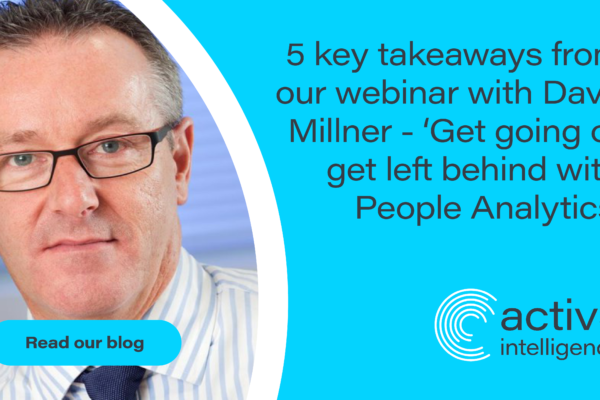Our recent webinar saw Managing Director Heidi Lopez speak to Dave Millner, people analytics expert and founder of HR Curator at our recent webinar ‘Get going or get left behind with People Analytics’. As businesses redefine themselves in the wake of the pandemic, more organisations are adopting people analytics to make informed decisions about their workplaces. Dave strongly believes that those who don’t get going will run the risk of falling behind. From our conversation, here are some tips for getting ahead.
- The value of mentoring programmes
Dave spoke about a global bank in which only five business units were meeting their targets, with the remaining 14 underperforming. The bank was also struggling to grow the use of people analytics and herein lay an opportunity for the Learning and Development team.
The team created a six-month mentoring scheme in which data on employee engagement was collected and leaders of high-performing units coached those leading underperforming parts of the business on how to improve engagement metrics. As a result, sales improved by 9% and customer satisfaction by 5%, representing a significant net promoter score increase.
Key takeaway: Using people analytics to identify your best performers can provide an opportunity to mentor others and help improve organisational performance.
- Data doesn’t have to be complex
Within this bank, all the success of data collection and resulting mentoring came about without complex data or applications. No statistical correlation or algorithms were used. Instead, simple data was laid out in a spreadsheet with common demographic data, jargon-free language and a clear focus on how and when to mentor colleagues.
Key takeaway: Simple solutions informed by simple data had a profound impact on this global business. If you’re getting started with analytics, don’t be tempted to overcomplicate your data insights unnecessarily, instead focus on clear, actionable numbers to bring about quick and efficient change.
- HR spends too much time on operational puzzles
According to Dave’s research, nearly 40% of HR professionals are bogged down dealing with operational challenges that line managers can’t do, won’t do or believe HR should do. Instead of focusing on symptoms, such as lack of productivity with team building exercises, HR will get more benefit from turning people issues into business issues and therefore dealing with the root causes.
By looking at the numbers, such as statistics on retention, HR can identify areas that need improvement and bring the factors that help high-performing teams thrive into play.
Key takeaway: Make sure your HR team’s main priority is to facilitate greater performance of the organisation rather than focusing on smaller issues that other team members can solve.
- Tell a better story by connecting data
A strong relationship between HR and the FD can connect the dots when it comes to data and the story of the business. The CFO has a focus on hard numbers that inform and predict organisational performance along with data that shows which teams are exceeding or meeting targets consistently. In tandem, HR is gathering people data from these teams and understands areas for improvement.
Key takeaway: By joining financial and people data, you can begin to draw conclusions and suggest solutions to your CEO. Dave shared the example of Hilton Hotels in which every HR professional is tasked with spending a minimum of a day with a member of the finance team which is one way to strengthen this relationship.
- Bigger doesn’t mean better
Smaller businesses are often put off by people analytics because it seems like a colossal undertaking requiring large-scale resources and expert teams to match. This is a myth. At the very least, smaller organisations allow for data to be gathered more effectively.
On a day-to-day basis, discovering why things are happening can be done in house with minimal complexity. While there will come a point where you need more qualified input, you can buy in expertise as needed instead of a full-time hire.
Key takeaway: Don’t let the size of your organisation dissuade you from utilising people analytics. Think about the efficient, insightful changes you can make with quick decisions based on numbers.
Listen on-demand
Our interview with Dave shows that people analytics aren’t reserved for large dedicated teams in huge organisations but a highly useful, necessary choice that can be made by any leader to improve their business with data-driven decisions.
Listen to our free on-demand webinar here or if you would like to see our people analytics platform – illumin8 in action then book a demo here.




